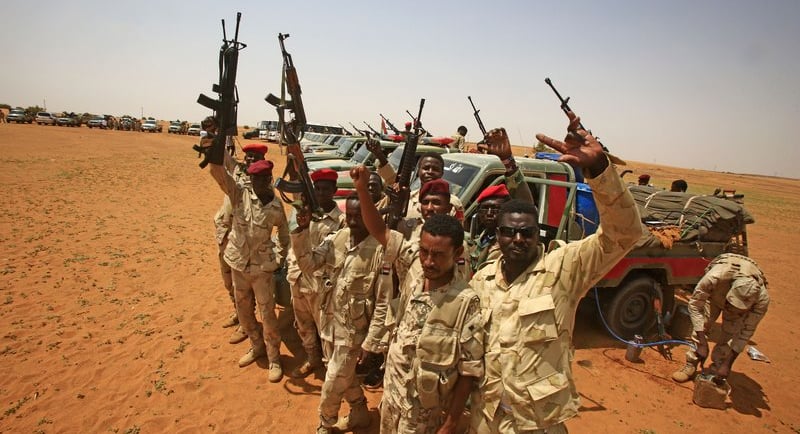Blood, Gold, and Power: Drivers of UAE’s Alleged Support for Sudan’s RSF and Its Implications
Sohaila Shamseldeen, International Relations Researcher | Master of Law & Economics, University of Hamburg
9/3/20254 min read


Sudan, once seen as a beacon of hope after the 2019 ouster of dictator Omar al-Bashir, has descended into a brutal civil war. The conflict, a vicious power struggle between the Sudanese Armed Forces (SAF) and the paramilitary Rapid Support Forces (RSF), has shattered the nation, displaced millions, and created one of the world's worst humanitarian crises.
But this is not just an internal conflict. Lurking in the shadows is a powerful external player: the United Arab Emirates (UAE). According to UN monitors, investigative journalists, and regional experts, the UAE has been a key backer of the RSF, allegedly providing a steady stream of financial and logistical support that has turned a political dispute into an unwinnable war.
This is the story of how a transactional foreign policy, fueled by a thirst for gold and geopolitical influence, has helped push Sudan to the brink of collapse.
The UAE's Two-Pronged Strategy: Geopolitics and Gold
The UAE's alleged involvement in Sudan is driven by a cold, calculated blend of political ambition and economic opportunism.
1. The Political Game: Countering Islamists and Projecting Power
The UAE's foreign policy is built on a foundation of counter-revolutionary pragmatism. In the wake of the Arab Spring, Abu Dhabi has consistently intervened in countries like Libya, Yemen, and Egypt to thwart the rise of Islamist movements and install friendly regimes.
In Sudan, the UAE saw the RSF and its commander, Mohamed Hamdan Dagalo (better known as Hemedti), as a reliable bulwark against Islamist factions within the traditional army. With its strategic location on the Red Sea, Sudan is a critical piece on the geopolitical chessboard. By backing the RSF, the UAE sought to secure a loyal partner to help project its influence along this vital maritime corridor and counter rivals like Turkey and Qatar.
2. The Economic Prize: Sudan’s Illicit Gold Trade
The relationship, however, is not just about politics. It is built on a river of gold. Sudan is Africa's third-largest gold producer, but a huge portion of its output is smuggled out of the country through illicit channels, bypassing the state and robbing it of vital revenue.
The primary destination for this smuggled gold? The UAE.
The RSF has seized control of key gold mining regions, creating a vast, independent financial empire. Investigative reports from organizations like Global Witness and the UN have detailed how UAE-based trading companies systematically buy this "blood gold" through RSF-linked networks, exploiting Dubai's notoriously weak verification systems. This illicit trade provides the RSF with tens of millions of dollars in monthly revenue, allowing it to buy weapons, pay its fighters, and operate with complete autonomy from the state.
The Devastating Consequences of Shadow Support
The UAE's alleged backing of the RSF has had a catastrophic impact on Sudan.
Fueling the War Machine: The steady flow of cash and alleged logistical support has transformed the RSF into a formidable fighting force, enabling it to seize control of key territories and prolong the war. Its financial independence makes it immune to international pressure, rendering ceasefire talks and peace agreements virtually meaningless.
Entrenching a War Economy: The conflict has shattered Sudan's formal economy. GDP has plummeted by over 15%, inflation is rampant, and the state's ability to collect revenue has collapsed. In its place, a war economy has emerged, built on illicit trade and controlled by warlords.
Unleashing a Humanitarian Nightmare: The war's toll on civilians has been horrific. Over eight million people have been displaced, and nearly half the population faces acute food insecurity. RSF-affiliated militias have been implicated in widespread atrocities, particularly in Darfur, echoing the genocidal violence of the Janjaweed two decades ago.
A Fractured Region and a Helpless World
The conflict has also exposed deep rifts among regional powers. Egypt, a traditional ally of the Sudanese army, sees the UAE-backed RSF as a direct threat to its influence. Saudi Arabia, caught in the middle, has tried to mediate, but its efforts have been undermined by the competing agendas of its Gulf neighbors.
Meanwhile, the West has been rendered largely ineffective. Targeted sanctions have done little to stop the flow of illicit gold, as international leaders have been reluctant to apply meaningful pressure on a key economic partner like the UAE.
The result is a dangerous stalemate that risks turning Sudan into a "Libya on the Nile"—a failed state torn apart by rival factions, sustained by external patrons, and trapped in a perpetual cycle of violence.
Conclusion: A Path to Peace Requires Cutting the Financial Lifeline
The UAE's transactional foreign policy—publicly calling for stability while privately fueling conflict—has been a key driver of Sudan's tragedy. A sustainable peace will remain out of reach as long as the RSF can fund its war machine with a steady stream of blood gold.
To break this cycle, the international community must move beyond rhetoric and take decisive action. This includes:
Creating a Verifiable Gold Certification System: Modeled on the Kimberley Process for diamonds, this would increase transparency in the global gold trade and cut off the RSF's primary source of revenue.
Applying Coordinated International Pressure: The US, EU, and other global powers must use their collective leverage to hold external actors accountable for fueling the conflict.
Forging a Red Sea Security Compact: Regional powers like Egypt and Saudi Arabia must work together to mitigate the risks of proxy wars and establish a framework for collective security.
Without a concerted effort to dismantle the war economy, Sudan is destined to remain a prisoner of its own conflict, a tragic testament to the devastating consequences of when blood, gold, and power collide.
Download the full study here.
Empowerment
Amplifying African voices for sustainable progress together.
Contact US
Growth
Street No. 3281, N'Djamena, Republic of Chad.
© 2024. All rights reserved.